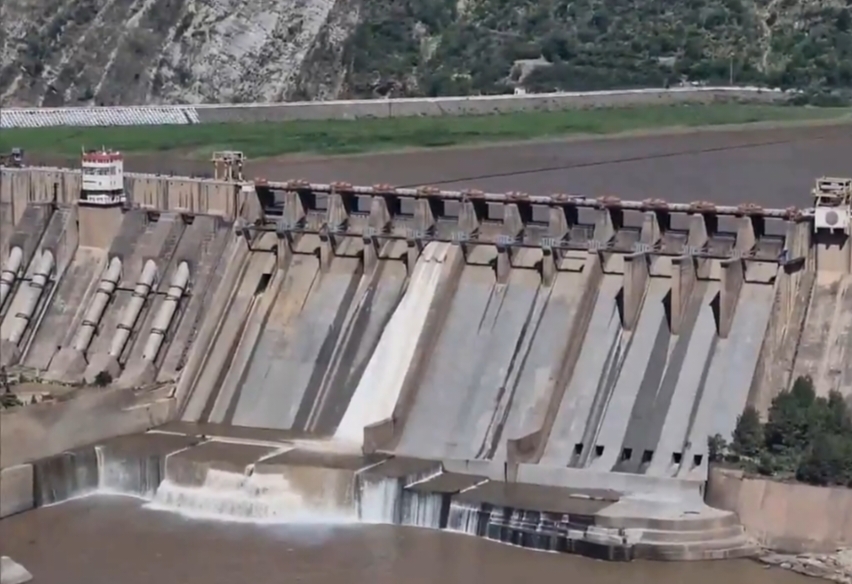India Suspends Indus Waters Treaty with Pakistan Following Pahalgam Terror Attack: Visuals of Salal Hydroelectric project

In a significant escalation of tensions, India has suspended the Indus Waters Treaty (IWT) with Pakistan, a decision announced on April 23, 2025, in response to the deadly Pahalgam terror attack that claimed 26 lives, mostly tourists, in Jammu and Kashmir’s Anantnag district on April 22, 2025. The move, part of a five-point action plan approved by the Cabinet Committee on Security chaired by Prime Minister Narendra Modi, cites Pakistan’s sustained cross-border terrorism targeting Jammu and Kashmir as a breach of the treaty’s conditions.
The 1960 IWT, brokered by the World Bank, allocates the waters of the eastern rivers (Sutlej, Beas, Ravi) to India and the western rivers (Indus, Jhelum, Chenab) to Pakistan, with India permitted limited non-consumptive uses, such as hydroelectric power generation, on the western rivers. The suspension, effective immediately, allows India to explore new options, including fast-tracking hydroelectric projects like the Kishenganga and Ratle projects, halting Pakistani inspections, and potentially building storage infrastructure on the western rivers, which was previously restricted.
Pakistan has strongly condemned the suspension, labeling any attempt to block or divert water flows as an “act of war” and warning of a response with “full national power.” The country has also closed its airspace to Indian airlines and suspended bilateral agreements in retaliation.
Visuals from Salal Hydroelectric Project
Amid this diplomatic standoff, visuals from the Salal Hydroelectric Project, located on the Chenab River in Reasi district, Jammu and Kashmir, have surfaced, highlighting India’s infrastructure on the western rivers. The Salal Project, a run-of-the-river hydroelectric facility, is one of several projects India operates under the IWT’s provisions. Constructed in two stages with a total capacity of 690 MW, the project underscores India’s capability to harness the Chenab’s waters for power generation, a point of contention with Pakistan, which has raised objections to similar projects like Kishenganga and Ratle, citing potential impacts on downstream water flow.
The visuals, shared by ANI, come as India signals a shift in its strategic response to cross-border terrorism, with locals in Reasi expressing support for the treaty’s suspension. A resident remarked, “Pakistan-sponsored terrorists kill our innocent people… the Modi government has made this decision to cut off Pakistan’s water supply,” reflecting sentiment that the IWT unfairly favored Pakistan, which receives about 80% of the Indus basin’s waters.
Regional and Global Reactions
The suspension has sparked concerns about its impact on Pakistan’s agriculture and energy sectors, which rely heavily on the western rivers. Pakistan’s hydropower projects, contributing nearly 25% of its electricity, and irrigation-dependent crops like wheat and rice could face significant challenges if water flows are disrupted. However, some experts, like retired professor Dr. Khalid, argue the immediate impact on Pakistan may be limited, as India still uses only about 20% of the Chenab and Jhelum waters.
Globally, the UN has urged both nations to exercise “maximum restraint” to prevent further escalation, condemning the Pahalgam attack while expressing concern over the deteriorating situation. The U.S. House Committee on Foreign Affairs also criticized certain media coverage of the attack, reflecting international attention on the crisis.
Local Developments
In Jammu and Kashmir, security forces are intensifying operations. Army Chief General Upendra Dwivedi arrived in Srinagar on April 25 to review the situation, accompanied by Northern Command’s Lt. Gen. MV Suchindra Kumar. A gunfight broke out in Bandipora district, and the houses of two suspected Lashkar-e-Taiba terrorists linked to the Pahalgam attack were demolished in Anantnag. The attack, claimed by The Resistance Front (TRF), an offshoot of LeT, targeted tourists in Baisaran valley, known as “mini Switzerland,” and has been widely condemned.
Strategic Implications
India’s decision to suspend the IWT, coupled with actions like closing the Attari-Wagah border, expelling Pakistani diplomats, and suspending visas for Pakistani nationals, marks a significant shift in its approach to Pakistan. The move corrects what some, including former Indian Commissioner for Indus Waters P.K. Saxena, call a “historic blunder” in conceding 80% of the Indus basin’s waters to Pakistan under the treaty. Analysts suggest India could now leverage its engineering capabilities to enhance storage and hydropower projects, potentially altering the regional water dynamic.
As tensions escalate, the suspension of the IWT, symbolized by the strategic importance of projects like Salal put emphasis on a new era in India-Pakistan relations, with water emerging as a critical leverage point in the ongoing conflict.




